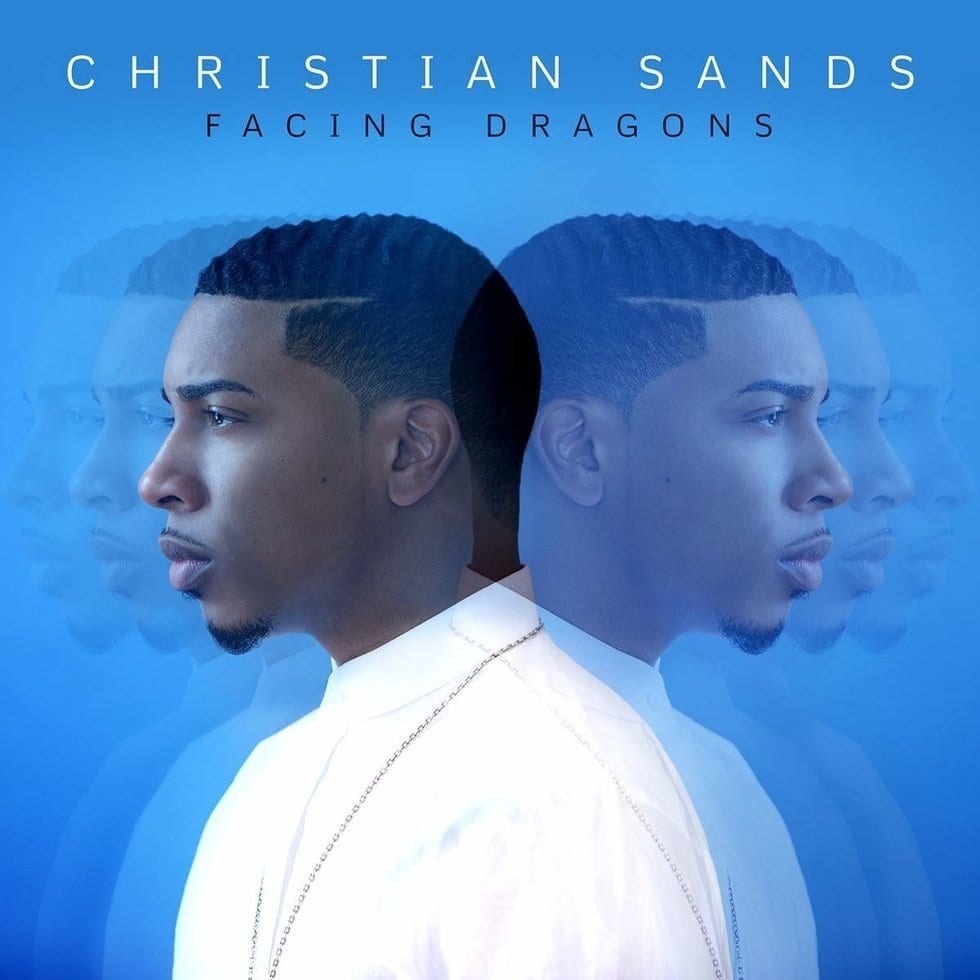
Christian Sands is a 29-year-old jazz pianist who is working in the soulful mainstream. His biggest sideman gig was in bassist Christian McBride’s band Inside Straight, which tells you where Sands lives musically: “inside” modern jazz traditions rather than being an “outside” player in the avant-garde and “straight” ahead—swinging grooves that provoke a head nod, a tapped toe. Facing Dragons is his second full-length recording for the similarly straight ahead Mack Avenue label, but it is also his most wide-ranging, inviting work.
This work is distinguished on two tracks by appealing writing for a front line of trumpeter Keyon Harrold and saxophonist Marcus Strickland, who are often joined in their melodic lines by Caio Afiune on guitar. This sound, the three voices blending on a tune like “Fight for Freedom”, puts you in sonic space of Art Blakey and the Jazz Messengers or one of those great dates by trumpeter Freddie Hubbard featuring Joe Henderson. At the end of “Fight for Freedom”, after the theme has been played, Sands and his three front-line partners improvise freely and collectively for over a minute on a simple cadence, developing a free flow and a set of accents. It’s among the coolest, loosest things on the recording.
“Frankenstein” is a more casual, impressionistic quintet track that also evokes 1960s Blue Note material. Harold, again, is Hubbard-esque, and Sands—perhaps inevitably—sounds like Herbie Hancock, using a couple of Hancock-ian signature bits in solos and his comping—two-handed octave runs, downward glissandi at ends of phrases. The horns and the piano trades short solos, keeping the conversation quick and interactive.

At the other, also intriguing, end of Facing Dragons is Sands’s interpretation of Paul McCartney’s “Yesterday”, recast as a jazz piano kaleidoscope. It starts with a statement of the melody as Errol Garner would have played it, interrupted by small gospel sections.The gospel groove serves as the underpinning for bass solo by Yasushi Nakamura. Sands restates the Garner-fied theme and then opens up an improvisation over a backbeat-rich two-chord pattern that only gives way to the form of the tune after a long stretch. Sands plays lighting fast runs over the static pattern that stray far beyond gospel harmony—and eventually he moves into a filigreed and more modern patterning in the upper register. Perhaps it’s too much variation in a single cover, but it is fun to hear.
The trio is also featured in a more straight-forward way on the engaging “Rebel Music”, a swinger with a strong bass line and, in the ensembles, some ringing shimmer (a bit of Fender Rhodes? or guitarist Afiune creeping in? it’s hard to tell…) that adds a touch of candy to the sonic environment. Sands does play Rhodes on the final track, “Rhodes to Meditation”, a moody solo piece that creeps in like a slow fog. And he uses Hammond organ in additional to piano on the soulful “Sunday Mornings”, a clear reference to his musical upbringing in church music, though the tune itself moves around musically, surveying not just gospel but also soul and a splash of reggae, with Afiune strumming and eventually playing a highly amplified solo that soars up over the piano and B3 almost like a guitar line from a Steely Dan track.
Two performances go in Latin grooves of different kinds. “Sangueo Soul” uses a Venezuelan rhythm, courtesy of Cristian Rivera’s percussion along with drummer Jerome Jennings, and “Samba de Vela” is of course a Brazilian track. Sands and Afiune are strong partners on both of these, the guitarist taking the lead with a clean-toned jazz guitar sound on the latter. The upshot of all the strong playing, however, is a sense that Sands, as an artist, is still looking for his identity, the focus of who he will be as a more mature player and composer. Gospel/soul and Latin grooves and 1960s Blue Note modernism and moody impressionism are all here. It all sounds great and it all sounds slightly anonymous.
The track that most jumps out may be the ballad, “Her Song”. It opens with Afiune playing solo guitar with the vulnerable tremolo of Bill Frisell, leading to a distinctive, mournful theme, played before and around a rich bass solo. Eventually, Sands moves into territory that might remind some people of modern players such as Brad Mehldau, but the writing and arrangement is distinctive. Sands’s solo is brief and brings him to a cool unison line with the guitar that takes the tune somewhere new before the moody theme is reprised. This is the music that seems most connected to 2018, with a drum groove that is recorded with some consciousness of hip-hop and a sense of structure that is more cinematic.
I hope this is where Christian Sands is going. He plays beautifully in so many styles. He honors and knows his predecessor masters. He can build a solo with drama, and he writes well. At 29, perhaps he doesn’t need to be himself yet. But soon. And he might just be getting close


